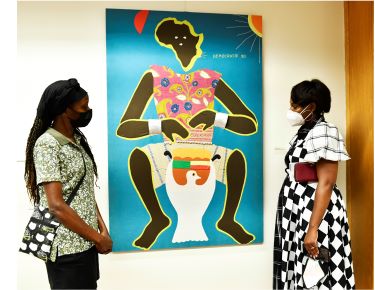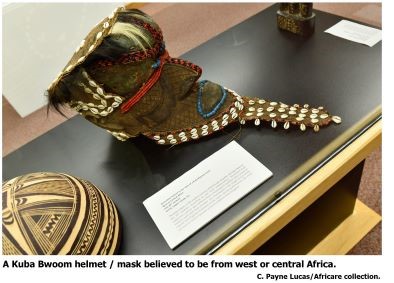
and Dr. Arlisha Norwood
The University of Maryland Eastern Shore unveiled a small sample of African art donated on behalf of a distinguished alumnus to coincide with the 2021 Founders’ Week celebration.
The university held a low-key reception at the Frederick Douglass Library Wednesday to give invited guests a peek at examples representative of an impressive collection of some 250 pieces of art assembled by the late C. Payne Lucas Sr.
Lucas, a 1959 graduate, was a co-founder of Africare, a non-government organization that veterans of the Peace Corps formed in 1970 to address “African development and policy issues by working in partnership with African people to build sustainable, healthy and productive communities.”
Known to friends and associates as “Luke,” he was the son of North Carolina sharecroppers who became the non-profit’s second president, holding the post from 1971 until 2002.
Along the way, he collected African art from nations across the continent where Africare operated, which in turn became part of the organization’s cultural holdings.
UMES President Heidi M. Anderson told reception guests the university was humbled to accept the artwork from Africare because she said she hopes it might inspire students and alumni to make a difference on a global scale in careers they choose. Lucas’ humble beginnings and earning a UMES degree, she said, prove demonstrably hard work will lead to success.
Lucas spent four years in the Air Force, interrupting his pursuit of an undergraduate degree in history at then Maryland State College.

After receiving a master’s degree in government from American University in 1961, he accepted a job with the Peace Corps. He rose through its ranks to serve as assistant country director in Togo, country director in Niger, director of the Africa Region and director of the Office of Returned Volunteers.
“It was in the Peace Corps and in the years he spent in Africa, guiding predominantly white volunteers in transcending race and culture that Luke began to shape strong feelings regarding ‘diversity,’” wrote friend and colleague Kevin G. Lowther in a tribute when Lucas retired.
It was widely thought Lucas might be in line for an appointment to a position in the administration of Hubert H. Humphrey had the Minnesota Democrat defeated Richard M. Nixon in the 1968 presidential race.
“Instead,” Lowther wrote, “it was another president – Hamani Diori of Niger – who urged his old friend to rescue a struggling village health project called Africare.”
“Without Nixon’s victory,” Lowther noted, “there would have been no Africare.”
Over five decades, Africare invested “approximately $2 billion in 38 African countries,” according to the organization.
Lucas’ accomplishments earned him the President’s Award for Distinguished Federal Civilian Service in 1967 from Lyndon B. Johnson and the 1984 U.S. Presidential End Hunger Award for Outstanding Individual Achievement “in the effort to achieve a world without hunger.”
He was a sought-after speaker as well as an admired writer and activist who “brought a unique blend of passion and steadfast commitment to his 40-year career in African development.”
His death in 2018 was reported on by the nation’s major newspapers; those who worked with him or admired him also offered heartfelt tributes.
Africare announced in August 2020 it was relocating from the United States to Senegal, where it now operates as “PanAfricare and “will continue … implementing programs with a commitment towards ‘improving lives and building futures’ on the African continent.” In preparation for the move, the organization arranged to share its art holdings with UMES and the Smithsonian Institution as a lasting tribute to its co-founder.

